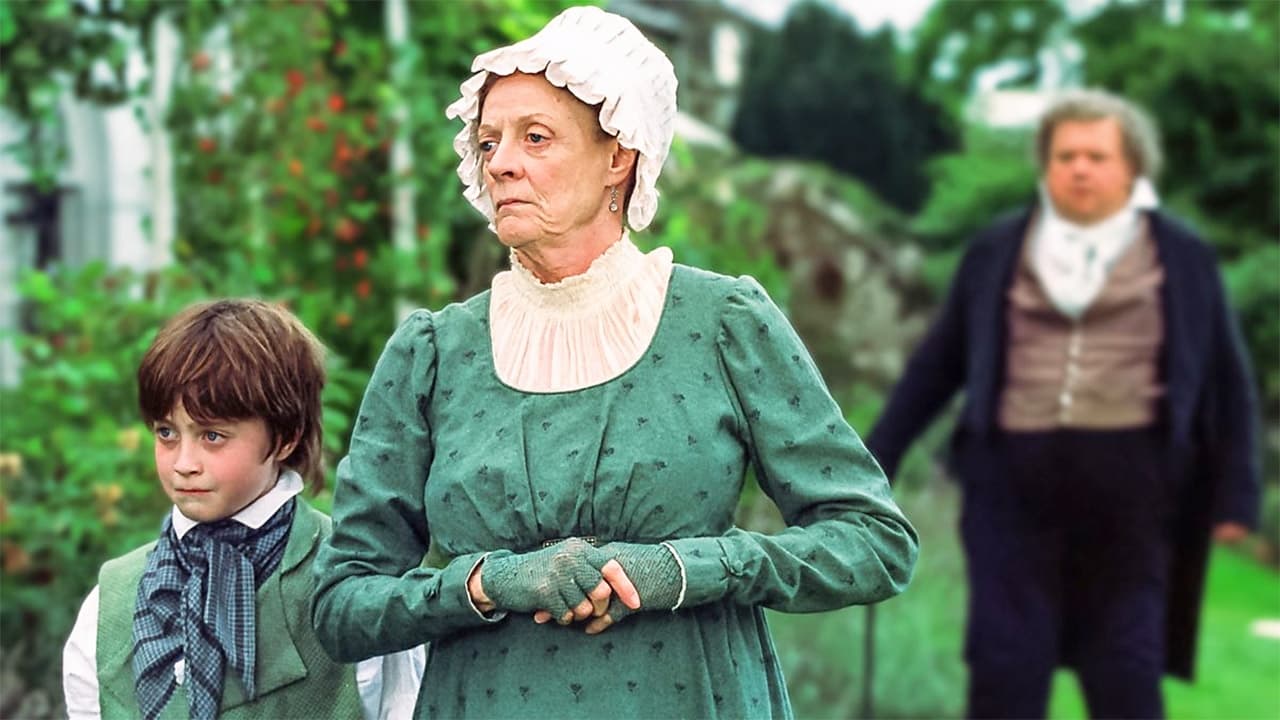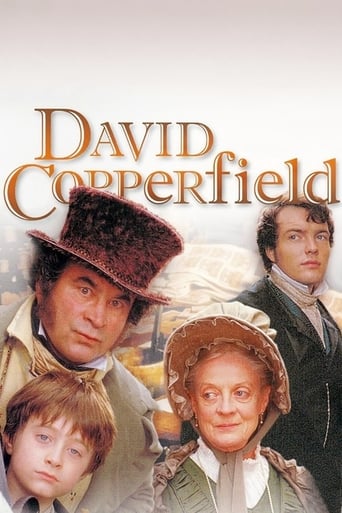

A brilliant latter-day adaptation of Dickens' autobiographical masterpiece that scores rising triumphs on all fronts. As a Dickens fan, I have recently experienced some unpleasant revulsion at the latest Oliver Twist mutations both on film and on the once fine Masterpiece theater. In fact, I very nearly passed on this rendition of Copperfield due to an ever creeping jaded cynicism, not realizing that as recently as 1999, the world still spun on its axis and the preservation of art was still considered precious. Check this out, it is marvelously executed, well acted, and to those few who still care for such things, faithfully adapted!. My summary line comes as you will no doubt surmise from the cast which includes a very young Radcliffe, and not so young but terrific as always Maggie Smith, Zoe Wannamker etc. All sensational!
... View MoreDavid Copperfield is a word by word adaptation of the famous (controversially biographical) novel by Charles Dickens. Daniel Radcliffe plays David,who happens to lose his father posthumous to his birth,and falls into the hands of an evil step father and a step aunt.All goes by the novel,but what you would love in the adaptation is the beautiful england countryside,and also the actors in the movie(You can see where Harry potter and LOTR got their stars from) who do justice to the Dickens Masterpiece. The DVD is worth buying and treasuring as it easily stands for generations,if you don't intend on reading the novel. All is said,enjoy!
... View MoreFor me, 'David Copperfield' was quite the revelation as a film as it was one of the few times I could tolerate Charles Dickens' adaptation and it was a chance to see Dan Radcliffe, before his rather mediocre performances as Harry Potter, prove he does have acting potential in him.As the grown author David Copperfield reminisces on his life, the film focuses more on his childhood years and how he survived being an orphaned boy, with an abusive step-father, growing up in the bleakness of the Victorian era.The cast is exemplary. Maggie Smith was just perfect as David's aunt, a woman who seems cold on the outside but does welcome the child into her home. Pauline Quirke stepped away from her usual comedic roles to play the maternal Pegotty, a lovable character who you truly felt cherished this little boy. Trevor Eve delivered a very chilling performance as the hideous stepfather Mr Murdstone who loathed David on sight with Zoe Wannamake equally as cruel as Murdstone's vile sister. Every actor did an excellent job of bringing their character to life and I don't think there has ever been such a well-cast drama. However, nine-year-old Daniel Radcliffe, who two years after this film would be cast to play Harry Potter, stole the show as the vulnerable but tenacious young David. It is easy to forget his bland wooden acting in the Harry Potter films as he throws himself into the role of winsome, wide-eyed David, wonderfully depicting the pains and joys of his character.'David Copperfield' has to be one of the best adaptations of a classic novel yet. The excellent script and wonderful actors mesh together to really bring the story to life and it reminds you that sometimes the BBC does get it right. It's a pity our TV license money couldn't go to making more like this.
... View MoreThis is Daniel Radcliffe's first movie, and he is wonderful in it!Charles Dickens, who wrote this story, lived in the 1800's. He is the only author whose popularity has come near to equalling that of JK Rowling! In his day, books were often published as serials in the newspaper. Dicken's books were so popular that people would queue in the street, waiting for the papers to arrive so they could read the next chapter. When a child died in one of the stories, people in both England and America went into mourning! In the book, David Copperfield tells his own story, from his birth (which is both sad and funny) to his marriage. Dicken's based the story of David Copperfield partly, but not exactly, on his own life. The dear, funny, optimistic Mr McCawber who cannot pay his debts, is based on Dicken's own father who was thrown in prison for unpaid bills.The terrible school and factory that David is put into by his cruel stepfather are taken from Dicken's life.Daniel plays David as a child. He is perfectly suited to the role. Among the other characters we find Zoe Wannamaker (Madame Hooch) as his horrible aunt and Imelda Staunton (who has just been chosen as Umbridge) playing the poor wife with soooo many kids who is in despair over her penniless husband.But the biggest star of the show is Maggie Smith (Professor McGonagal) who plays the very eccentric but lovable Betsy Trotwood, who comes to adore David, but cannot stand donkeys under any circumstance! There is another lovely crazy character called Mr Dick and the ultimate crreeep called Uriah Heep. He is the slimiest, sneakiest, smarmiest person that you can imagine! There is just one real disappointment- the young man who plays the grown-up David! He doesn't look enough like Daniel. He has a very smug expression. His accent is wrong! His acting is not at all convincing! I really wish that they had chosen someone else! For young people who can read great big complex books like The Order of the Phoenix, this is for YOU! Mandyjam
... View More